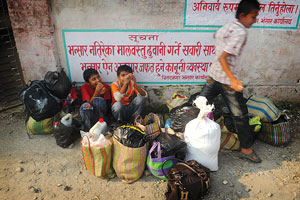 |
Nepal used to be a hub for Indian businessmen who imported Chinese goods illegally. But this trend decreased significantly after the Indian government opened its market to China. But a large amount of contraband timber still continues to enter the Nepali market through the porous Indian border. Nepal is also a transit point for illicit trade of red sandalwood from India to Tibet. Last month, a gang smuggling sea horses on this route were caught in Kathmandu.
Similarly, precious timber, herbs and wildlife from Nepal's hilly districts are exported to India and China. Illegally traded yarsagumba alone is worth millions. Even children are involved in this business.
Economists admit that such black market trade is a sizable chunk of the GDP. They also blame the fall in exports on growing illicit trade. According to the study, Birganj experiences the highest amount of unauthorised trade each year followed by Biratnagar and Bhairahawa.


